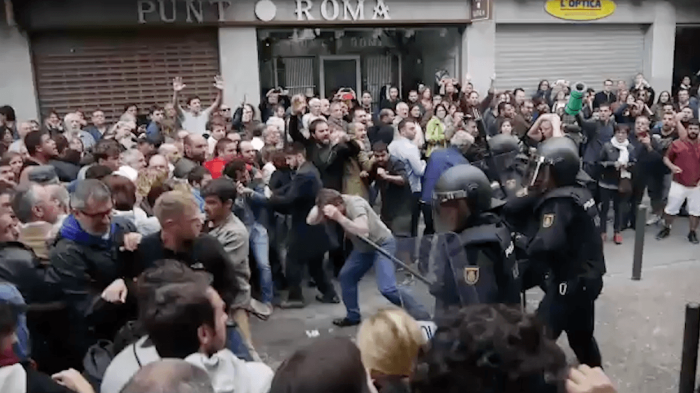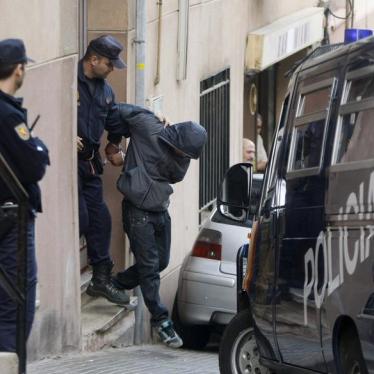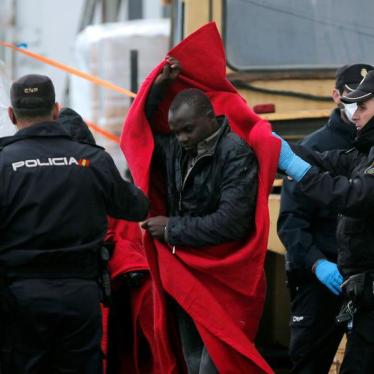(London) – Spanish police engaged in excessive force when confronting demonstrators in Catalonia during a disputed referendum, using batons to hit non-threatening protesters and causing multiple injuries, Human Rights Watch said today. Human Rights Watch received many allegations of unjustified police use of force on October 1, 2017, and carried out on-site investigations after the poll to document specific incidents.
Human Rights Watch spoke to victims and witnesses and reviewed video, photographic, and medical evidence from the city of Girona and two villages in Girona and Barcelona provinces. Human Rights Watch found that the Civil Guard (Guardia Civil) or National Police Corps (Cuerpo Nacional de Policia) at times used excessive force in all three locations on October 1 as they sought to execute court orders to prevent the poll.
“Our detailed investigation into three cases found that national police and Civil Guard officers used excessive force on October 1 in Catalonia,” said Kartik Raj, Western Europe Researcher at Human Rights Watch. “The police may well have had the law on their side to enforce a court order but it didn’t give them the right to use violence against peaceful protesters.”
Despite being declared unconstitutional by Spain’s constitutional court, the Catalonia referendum took place on October 1. Across the region, the two police forces sent in by the central government, along with the Mossos d’Esquadra, Catalonia’s police force, sought to execute a court order to stop the referendum that also required them to respect “the coexistence between citizens.” They confronted largely peaceful protestors, although there were incidents in which some responded to the national forces with violence.
Hundreds were left injured, some seriously. Catalonia’s Health Department estimated on October 2 that 893 people had reported injuries to the authorities. Spain’s Ministry of the Interior said on October 1 that 19 national police and 14 Civil Guards had required urgent medical assistance, and that an “innumerable number of others” were injured.
Following the referendum, Human Rights Watch documented excessive use of force against peaceful demonstrators by Civil Guards or national police at a primary school in Girona being used as a polling station, and in the hillside villages of Aiguaviva (Girona province) and Fonollosa (Barcelona province). Human Rights Watch received other allegations and purported evidence of police ill-treatment, which it has not been able to verify or examine in detail, along with instances of assaults on police officers by some demonstrators.
Footage and photos published by the media and uploads to social networks reviewed by Human Rights Watch appear to show many other instances of manifestly disproportionate use of force against people assembled peacefully in and around polling stations, expressing their political opinion, and in some cases using non-violent disobedience to obstruct police.
The Spanish government has insisted that all actions by law enforcement officers “were prudent, appropriate and proportionate to the objective of ensuring compliance with the law and the rights of all citizens,” and further said that the police actions “were not directed against citizens or their ideas.” On October 6, however, the central government’s representative in the region expressed regret and apologized for the police interventions during a television interview.
The Spanish government has an obligation to ensure that an effective investigation is carried out into the allegations of excessive use of force, including the serious incidents documented by Human Rights Watch. Given the current tensions between the central and regional authorities and complex questions of jurisdiction, Spain should consider asking for assistance from an independent international expert body, Human Rights Watch said. As of October 8, 23 different courts in Catalonia were examining allegations of police misconduct, with one investigating complaints made by 36 individuals relating to 17 sites in Barcelona.
In Girona (population 98,255), Human Rights Watch interviewed 37 people who experienced or witnessed police violence, 15 of whom showed evidence of injuries they said were due to police ill-treatment. Witnesses at the Coŀlegi Verd primary school polling station on Carrer Joan Maragall told Human Rights Watch that shortly after 9 a.m. on October 1, national police used batons and shields to charge repeatedly at a cordon of people who had linked arms to stop them entering through the school gate, hitting the protestors on their heads, arms, legs, and torsos. The police did not issue a warning before charging, and fired blanks into the air, frightening young children who were present.
Footage and evidence seen by Human Rights Watch corroborates witness accounts that once inside the school compound, national police officers struck people with batons, bruising them. One parent who reported being hit was an off-duty policeman in the Mossos, and another injured was an off-duty firefighter.
Elsewhere in Girona, at the Sant Narcís polling station, Xevi Gil Rosdevall, a 47-year-old uniformed firefighter, said his arm was broken by a police baton. He showed Human Rights Watch video of the incident that appeared to confirm that he posed no threat to police.
In Aiguaviva (population 763), Human Rights Watch spoke to several residents who experienced, witnessed, or filmed police violence on October 1. At approximately 3:45 p.m., about 50 national police entered the village where a crowd of between 70 and 100 people was assembled with a festive meal and flowers outside a polling station in the village hall.
One villager, Jaume Mas, a 52-year-old technical engineer, said he asked the police for a copy of the judicial order authorizing their entry. He says they responded by hitting the crowd with their batons. Human Rights Watch saw video and still images showing a national police officer using a canister of irritant spray around Mas and others nearby, when they presented no imminent danger.
A 38-year-old man who wished only to be identified as “Ramon” for fear of reprisals, told Human Rights Watch he was struck by police on October 1 as he was filming their seizure of ballot boxes in Aiguaviva. Footage shows a policeman hitting the arm holding the camera twice. Subsequent footage shows police pushing Ramon out of the village hall and him landing 4 or 5 meters across the stone paving of the village square. The incident took place after police had secured the ballot box and voting papers. Ramon said he was left with bruising or swelling on his right torso, neck, left leg, left hand, and throat, and showed Human Rights Watch his medical report and some of his injuries.
In Fonollosa (population 1,401), Human Rights Watch interviewed six residents, including the mayor, three of whom said they were among those injured by police on October 1. The villagers said they had set up hay bales decorated with flowers as a symbolic barrier at the largest of the three polling stations in the area. They explained their shock at the arrival at about 1:30 p.m. of what they estimated to be 70 police officers led by Civil Guards, including plainclothes officers who seized ballots and boxes.
A 42-year-old mechanic who asked to be identified only as “Francesc” reported being picked up by four guards, carried across the square, dropped to the ground, forcibly restrained, punched, and kicked in the head, even though he was not blocking their entrance to the hall. Human Rights Watch has seen their injuries and footage from multiple angles and medical reports that corroborate their accounts.
Spain is a party to the European Convention on Human Rights as well as the International Covenant on Civil and Political Rights, which impose specific obligations with respect to the right to peaceful assembly, freedom of expression, and use of force by law enforcement. Spain must ensure that people enjoy the right to peaceful assembly and can express their opinions freely. While the government can impose some restrictions on those rights, measures must be necessary and proportionate for a legitimate aim. Even where people may be acting unlawfully, the state cannot deprive them of their rights, or use excessive force.
Human rights standards on the use of force require police to use alternatives to force wherever possible. Spanish law governing the Civil Guard and the National Police Corps, and the latter’s ethical code, incorporate human rights norms and are clear that where force is considered necessary, police should exercise restraint and act proportionately to the threat posed, and seek to minimize damage and injury. As the political tensions between Catalonia and the Federal government continue, it is essential that any future police deployment adheres strictly to these standards. The institutions of the European Union and EU member states should also publicly make clear to the Spanish authorities that any force used by police has to comply to national and European human rights laws.
“At such divisive times it is especially important that authorities respect human rights, including freedom of speech and assembly, and the rule of law,” Raj said. “Pledges from Madrid and Barcelona to cooperate fully with an independent investigation into the violence on October 1 would be an important step towards restoring confidence and trust.”
Background
After the Catalan regional parliament agreed on September 6 to hold an referendum on independence, Spain’s central government lodged an urgent legal challenge at the Constitutional Court, which ruled on September 8 that such a poll was unconstitutional and should not take place.
The Attorney General, with the agreement of regional and municipal counterparts in Catalonia, instructed central and regional police forces to cooperate, serving the function of judicial police, to stop voting from taking place on October 1, but required that the order be carried out in a proportionate manner that respected the “constitutional coexistence” of citizens. An estimated 10,000 police were in Catalonia on October 1.
An amendment to the Penal Code in 2005 decriminalized participation in a referendum deemed illegal by the national courts, which between 2003 and 2005 carried a possible prison sentence.
The Spanish government has an obligation to ensure that an effective investigation is carried out into the allegations of excessive use of force. Given the current tensions between the central government in Madrid and Catalan authorities and complex questions of jurisdiction, the involvement of an independent international expert body such as the Council of Europe, Commissioner for Human Rights, or the Office of the UN’s High Commissioner for Human Rights might be an effective way of ensuring its credibility with all parties. Such an investigation would benefit greatly from the cooperation of Catalan and Spanish ombudsman institutions (Sindic de Greuges and Defensor del Pueblo).
Under international human rights standards, Spain should ensure that all those who have a credible claim their rights were violated, in particular as a result of alleged police abuse, have an effective remedy available to them to investigate, and if necessary redress, the potential rights violations. If domestic remedies are inadequate or unable to provide a satisfactory outcome for alleged victims, then individuals have the right to go to the European Court of Human Rights to have the actions of the Spanish authorities investigated and judged for their human rights compliance.
Selected Accounts
Girona
Ricardo Frigola, a 70-year-old man originally from Mexico, who was pushed and knocked over by police and sustained injuries to his ribcage, said, “I’ll recover from the injures. Yes, of course. But I’m not sure I’ll ever recover from what they did to me.”
Carsten Treuzettel, a 46-year-old German citizen, who has lived in Girona for 22 years and has a child who attends the Coŀlegi Verd, was standing in the patio, when a national police officer hit him with a baton. Treuzettel said, “The first ones who came over the gate began immediately beating people. There was no advice, nor warning. It was wrong. A policeman came towards me, and I stepped to one side to let him go, but he hit me with his baton on the back of my legs. He took a second swing at my head, but I raised my left arm and stopped it hitting my head.”
Xevi Gil Rosdevall, a 47-year-old firefighter who was at the nearby polling station of Sant Narcis in uniform to mediate between protestors and police, ended up with a fractured metacarpal and multiple baton bruises on his back and both thighs. He said, “They were hitting us to do harm, and again to do more harm. It was hitting for hitting’s sake.”
Georgina Vinyals, a 34-year-old psychologist, said, “I was standing right behind the front line of protestors outside the school, when the police started hitting them with batons and pushing us. I was hurt then. My neck is now in a collar and I hurt my elbow. I have been signed off work for 15 days.”
Jordi Pibernat, a 38-year-old social worker, said, “I was in the front line when they hit this young guy who fell over and was lying on the ground. I was trying to bend to lift him up and they kept hitting me with the batons. I have bruises on my arms. The ones that are deep and not yet purple are where they hit me hard.”
Aiguaviva
Jaume Mas, a 52-year-old technical engineer, injured during the national police efforts to shut down their village polling station said: “To have dialogue means, literally, have two sides speaking to each other. I repeated three times, in Spanish, to be sure it was in a language they understood, ‘We want to talk with your commander so we can ask him to show us a copy of the judicial order that allows you into this building.’ Silence. They answered us with batons and pepper spray. Not even one word from them. No one said why they were there, or what they were there for.”
“Ramon,” a 38-year-old locksmith, who the police struck twice on his arm while he tried to film their removal of the ballot box said, “The impact of being hit will go way, but I’m not sure what it’s left in my head ever will… I’m really worried that they’ll try and identify me because they don’t want what I was recording to come out. The police had a camera to film what they were doing. They were filming me while I was filming them removing the ballot box.”
Fonollosa
Magdalena Clarena, 70, said, “I was sitting in a chair and they told me to get up. I said I didn’t want to. Two Civil Guards grabbed me, dragged me away and pushed me to the floor. And then I felt a body land on me. And it was him [Jordi Puig de Llivol, see below]. Good thing he’s quite a skinny guy, luckily I only broke my wrist! I was so angry, I felt so helpless, and I wanted to fight with them. So even as the Guards were leaving I was waving my broken arm at them singing ‘Get out! Get out!’ All I can do is fight peacefully! I want to tell the world about what they did, so people in Europe and the rest of the world know what happened here.”
Jordi Puig de Llivol, a 31-year-old auto service technician, said, “They grabbed me by the wrists, lifted me and pushed me, and then they threw me into the yard in front of the church, and I landed on the poor woman who was already there. Then I got pushed down the stairs and felt the kicks and punches coming in. Everything hurts, but I don’t have too many bruises.”
Methodology
On October 1, a Human Rights Watch researcher travelled to Catalonia to investigate allegations of excessive use of force, visiting Barcelona, Girona, Fonollosa, and Aiguaviva. Human Rights Watch also received footage and images alleging excessive use of police force and attacks by demonstrators against police via e-mail, social media, and secure messaging services. Given the presence of unreliable and sometimes false information on social media relating to allegations of both police use of force and assaults on police, Human Rights Watch has only presented cases here that it has been able to verify. In conducting research into these three documented incidents, Human Rights Watch spoke face to face with 29 individuals who reported being ill-treated by police and 24 eyewitnesses (and several more by telephone), as well as local authorities in Fonollosa, Girona, and Barcelona. Human Rights Watch has contacted the Spanish government for comment. In stating the overall numbers of those wounded among protestors and law enforcement, Human Rights Watch has used official statistics without further comment.











